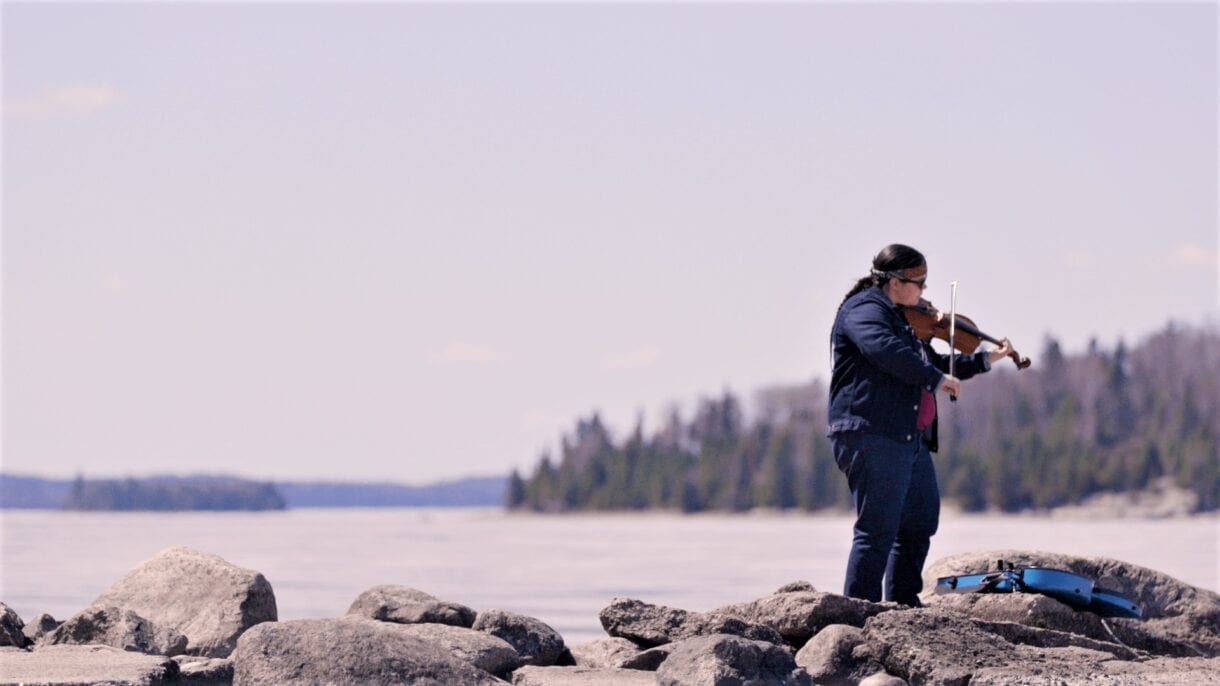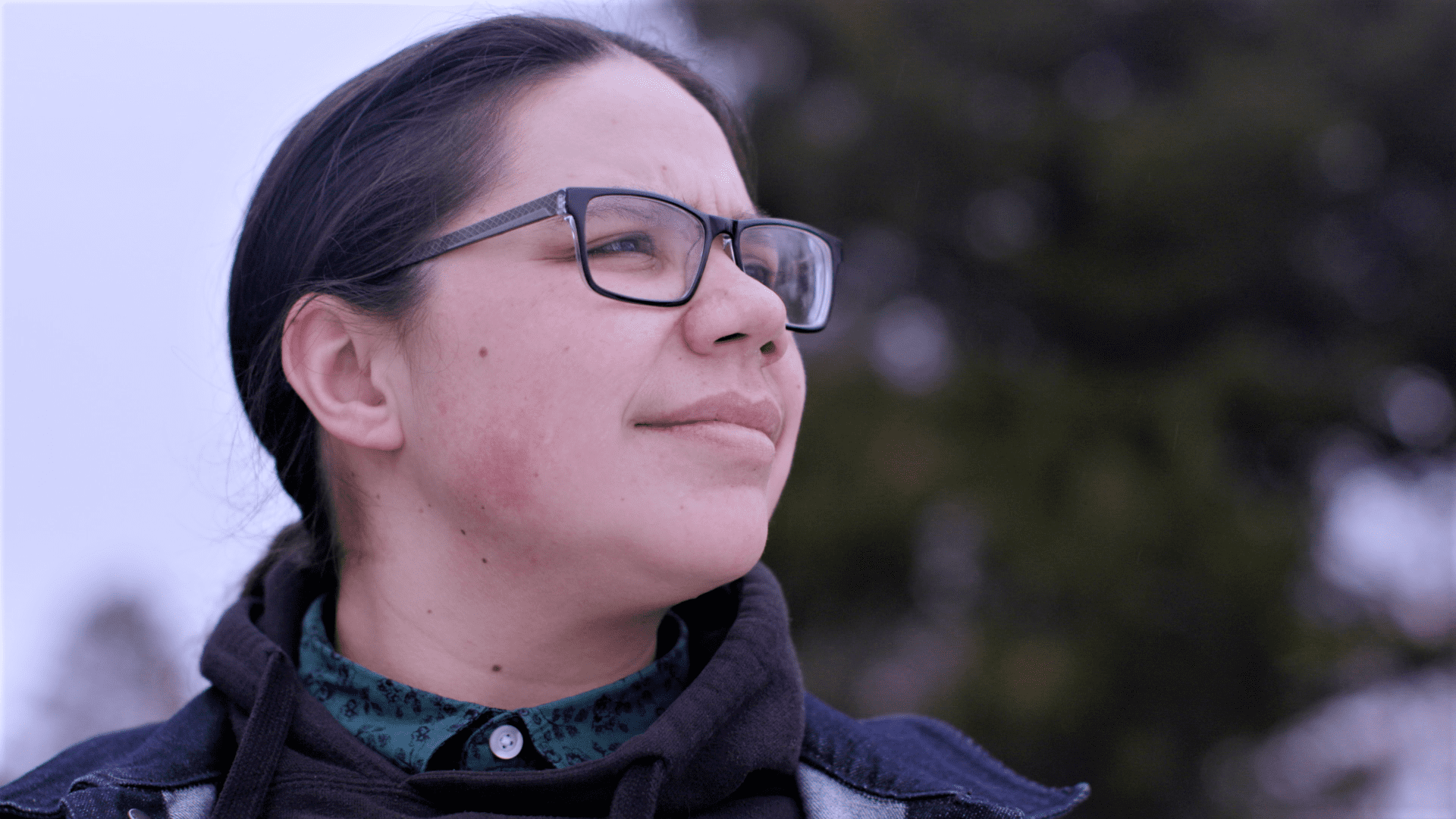Melody McKiver instills their musical work with the wisdom of elders and the cycles of the natural world. The Anishinaabe violist and composer is the next guest on the new APTN series Amplify, where Indigenous artists are invited to channel a source of inspiration into an original song. The Oct. 2 episode welcomes viewers to McKiver’s home in Ontario’s Sioux Lookout region. While their family grew up in the area, the Ottawa-raised musician was inspired to move there from Toronto in 2016: McKiver’s studies at York University had provided an intellectual understanding of colonization, residential schools and their intergenerational impacts, but they also wanted a deeper emotional connection to the land. “It’s hard work to rebuild your family genealogy, and something that can’t be done on a one-week visit like I was making on past trips,” McKiver says. “I wasn’t making the connections you need to get the information through oral histories, or the really intimate relationships you find in my family both on and off reserve.” In the opening credits of McKiver’s episode, Spring Break-Up, “water” is listed as a cast member—and it does play a prominent role. Through cinematically framed shots, time lapse montages and soaring drone footage, we see McKiver playing viola plugged into effects pedals on a dock mere feet above a frozen lake. As they explain in voiceover: “I am inspired, as the lakes and rivers thaw, finding their voice again. Water moves to sing with Creation and I want to join in, offering my own song, honouring it the best way I know how.” The episode begins with the gentle voice of Elder Ralph Johnson explaining the history of the Anishinaabe sunrise ceremony. A phrase he spoke to McKiver is used as the title of their new song, “Debiinaawe Giizhigon,” which roughly translates as “‘sound is at the centre of all creation.” The rhythmic cadence of Johnson’s words also provided the song’s 7/8 time signature, a pulse flowing through its strings, keys and drums. As McKiver explains, this number has spiritual significance within their community. “It’s almost like Anishinaabe pop culture,” McKiver says. “The seven grandfather teachings are a foundational framework and something you see on motivational posters that go up in schools. We have seven prophecies that talk about the Anishinaabe migration from living alongside the Wabanaki peoples on the Atlantic Coast and then migrating inwards towards the Great Lakes region prior to colonization. The seven fires is something that comes up quite frequently in Anishinaabe schools of thought, as well.” Because McKiver was denied access to these teachings as a child—as was their piano-playing mother—they grew up with the music of Western classical composers instead of Anishinaabe ceremonial songs. McKiver now strives to weave these worlds together with projects such as a dance performance reimagining Stravinsky’s Rite of Spring at an Anishinaabe burial site in downtown Peterborough. McKiver’s new song, “Debiinaawe Giizhigon,” is not the first time they’ve transformed words into pure sound. In 2019, the violist was commissioned to write a string quartet response to Steve Reich’s Different Trains. While the Jewish-American minimalist composer sampled the voices of Holocaust survivors for his 1988 album, McKiver used recollections from people in Sioux Lookout, reflecting on the notion of inherited memory. “Reich interviewed elders in his community, taking snippets or fragments of the words they were sharing and translated that into music,” McKiver says. “The pitch, cadence and rhythm of their words were transcribed and [translated into] instrumental compositions. I was very much aware of that technique and wanted to explore it further.” The result, Odaabaanag, is a propulsive, poignant composition for string quartet and electronics. There are ongoing challenges faced by the people of Sioux Lookout: poverty, addiction and horrific acts perpetrated against them by the Canadian government. McKiver’s grandmother was a residential school survivor, while their mother is a survivor of the Sixties Scoop, a story they share on Amplify in one of the episode’s most heartbreaking moments. “I can’t imagine how hard it is on a parent,” McKiver says, “to not be given the most basic of human rights to raise their own children.” Sharing their family history is one thing, but McKiver feels it’s no longer their job to educate wider audiences. “We have family members across the continent, so many people scattered against our will, and families shattered. The issues are ongoing with apprehension of Indigenous youth by child welfare agencies. The Truth and Reconciliation Commission finished in 2015, so if every Canadian hasn’t read it at this point, that’s not my problem. I share it within context, but people have a responsibility to sit down and understand this material for themselves.” On top of music, McKiver now works as a social worker in Sioux Lookout, providing cultural support and mental health resources to a new generation. They are impressed by the large number of young people they encounter who now identify as LGBTQ2. While the heavy hand of missionaries working at residential schools continues to foster a climate of intolerance among older community members, they see an exciting shift in consciousness on the horizon. “Homophobia isn’t a part of Indigenous culture,” McKiver says. “It was something that was very deliberately seeded. These are very recent histories of trauma that have impacted our understanding of gender and sexuality in the region. One of the main importances in my work is starting to create a culture of consent, and dismantling some of those harmful legacies that perpetuate today.” “Debiinaawe Giizhigon,” the song McKiver created for Amplify, is now available on Bandcamp and will be added to all streaming sites on Oct. 8, coinciding with the air date for the Anishinaabemowin version of the episode. Its sound is mournful but also rings with resilience and a belief in reconnection. By joining in with the sounds at the centre of creation, both natural and ceremonial, McKiver believes they can begin a new act of healing. “We talk about intergenerational trauma a lot,” they say in the show’s closing moments. “I’m trying to understand the flipside of what a process of regaining intergenerational knowledge looks like.”

Melody McKiver performing their new composition “Debiinaawe Giizhigon” on Amplify. Credit: Courtesy of Amplify


 Why you can trust Xtra
Why you can trust Xtra


